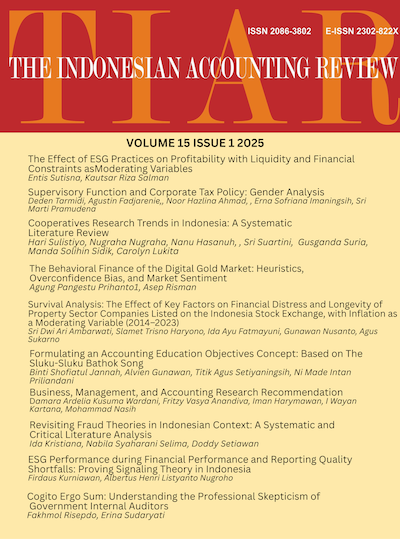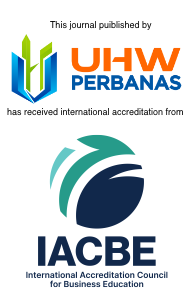Cooperatives Research Trends in Indonesia: A Systematic Literature Review
DOI:
https://doi.org/10.14414/tiar.v15i1.4858Keywords:
Cooperative, Literature Review, SintaAbstract
ABSTRACT
This research aims to explore the concept of structure and evolution of literature related to research trends on the topic of cooperatives in Indonesia. This research uses systematic literature observation (SLR) which focuses on findings from various studies that have been published in SINTA indexed scientific journals in Indonesia. Based on predetermined criteria, we used and analyzed 106 articles from 2021 to 2024. The decline in the number of articles about cooperatives over the last four years indicates a shift in focus or interest among researchers, thus indicating the need to re-raise the importance of cooperatives in economic and social development in Indonesia. The results of this study indicted that Regression analysis dominated quantitative research with 26 studies, followed by descriptive analysis with 10 studies. Descriptive analysis was also prominent in qualitative research with 31 studies. System analysis was applied to 3 quantitative studies and 4 qualitative studies, while the research desk was dominant in qualitative research with 11 studies. Other types of analysis used in quantitative research include AHP (1), BSC (1), data mining (1), panel data (2), gross up method (1), PATH (2), SEM (4), and case study (1). Cooperatives play an important role in the economy through human resource development, financial literacy, and the adoption of digital technology, as well as offering alternatives to sharia finance that are in line with Islamic principles. In the social aspect, cooperatives empower vulnerable groups, support entrepreneurship, and provide social assistance, increasing social stability and alleviating poverty. From the results of this research, it is recommended to researchers that to reverse the downward trend in research, strategic steps such as seminars, financial incentives, and institutional cooperation can be taken to generate interest in research on cooperatives.
References
Ali Fikri...[et al.]. (1997). Deskripsi Ekonomi Ribawi dan Islami Dalam Mustafa Kamal (ED). Wawasan Islam dan ekonomi: sebuah bunga rampai. Lembaga Penerbit Fakultas Ekonomi UI.
Andres Felipe Camargo Benavides1 • Michel Ehrenhard1. Rediscovering the Cooperative Enterprise: A Systematic Review of Current Topics and Avenues for Future Research. ISTR. Voluntas https://doi.org/10.1007/s11266-021-00328-8
Ardianto, E. (2011). Metode Penelitian Untuk Publik Relations Kuantitatif dan Kualitatif (Cet II). Simbiosa Rekatan Media.
Arikunto, S. (1998). Prosedur Penelitian: Suatu Pendekatan Praktek,. PT. Rineka Cipta
Azhari.2017. Peranan Koperasi Dalam Perekonomian Indonesia. Jurnal Serambi Ekonomi dan Bisnis│Vol. 4 (2), Agustus 2017, Hal. 47-52
Barker, C., Pistrang, N., & Elliot, R. (2002). Handbook of Research Methods in Clinical Psychology, 2nd Edition. In Behaviour Research and Therapy (Vol. 40, Issue 4). John Wiley & Sons, Inc. https://doi.org/10.1016/s0005-7967(01)00040-7
Basri, H. (2014). Using qualitative research in accounting and management studies: not a new agenda. Journal of US-China Public Administration, 11(10), 831–838. https://doi.org/DOI: 10.17265/1548-6591/2014.10.003
Cemal Karakas.2019. Cooperatives: Characteristics, activities, status, challenges. EPRS | European Parliamentary Research Service.
Chua. (1986). Radical Development in Accounting Thought. The Accounting Reveiew. https://doi.org/10.2308/bria-52377
Deddy Mulyana. (2006). Metodologi penelitian kualitatif : paradigma baru ilmu komunikasi dan ilmu sosial lainnya. Remaja Rosdakarya.
Djollong, A. F. (2014). Tehnik Pelaksanaan Penelitian Kuantitatif (Technique of Quantitative Research). Istiqra’ : Jurnal Pendidikan Dan Pemikiran Islam, 2(1), 86–100. https://jurnal.umpar.ac.id/index.php/istiqra/article/view/224
Doherty, B., Haugh, H., & Lyon, F. (2014). Social enterprises as hybrid organizations: A review and research agenda. International Journal of Management Reviews, 16(4), 417–436. https://doi.org/10.1111/ijmr.12028
Faizal Adhim. (2019). Identifikasi Peran Modal Sosial Koperasi Dalam Mendorong Kesejahteraan Anggota. Universitas Brawijaya, 58–67. https://jimfeb.ub.ac.id/index.php/jimfeb/article/view/5619/4932
Hendrikse, G. W. J., & Feng, L. (2013). Interfirm cooperatives. Edward Elgard. https://doi.org/10.4337/9781849803984.00038
http://repository.ikopin.ac.id/2292/1/2.%20Faktor-Faktor%20Pendukung%20Modernisasi%20Koperasi%20Ditinjau%20dari%20Internal%20dan%20Eksternal%20Koperasi%20-%20Wahyudin.pdf diakses: 2 Juni 2024
I Made Mahadi Dwipradnyana, I Gusti Nengah Darma Diatmika, & I Gusti Ayu Made Agung Mas Andriani Pratiwi. (2020). Strategi Pengembangan Koperasi Di Era Digital Pada Koperasi Yang Ada Di Provinsi Bali. Majalah Ilmiah Universitas Tabanan, 17(2), 112–116. https://ejournal.universitastabanan.ac.id/index.php/majalah-ilmiah-untab/article/view/87/84
ICA (International Cooperative Alliance) (2024), https://ica.coop/en/cooperatives/what-is-a-cooperative
ICA.2013. The Blueprint for the Cooperative Decade. https://ica.coop/en/media/library/fact-sheets-brochure-leaflet/blueprint-cooperative-decade
ILO (2002).https://libguides.ilo.org/cooperatives-en
Itang. (2016). Pemikiran Ekonomi Koperasi Mohammad Hatta Relevansinya dengan Etika Ekonomi Islam. Laksita Indonesia.
Jochen, R. (2023). Ekonomi Koperasi Teori dan Manajemen (Revisi). Salemba Empat.
Kalmi, P. (2007). The disappearance of cooperatives from economics textbooks. Cambridge Journal of Economics, 31(4), 625–647. https://doi.org/10.1093/cje/bem005
Kumaratih* and Tulus Sartono.2020. Cooperative Law Policy: Historical Study of Cooperative Settings in Indonesia. Jurnal Hukum Prasada, Vol. 7, No. 1, Maret 2020, pp. 34-44.P ISSN:2337-759X E ISSN: 2548-4524. https://ejournal.warmadewa.ac.id/index.php/prasada
Levi, Y., & Davis, P. (2008). Cooperatives as the “enfants terribles” of economics: Some implications for the social economy. Journal of Socio-Economics, 37(6), 2178–2188. https://doi.org/10.1016/j.socec.2008.06.003
Moh Kasiram. (2009). Metodologi Penelitian KualitatifKuantitatif (Cet II). UIN Maliki Press.
Munkner, H.-H., Henriques, A., & Hidayat, B. (2011). No Title. Reka Desa.
Murdiyanto, E. (2020). Metode Penelitian Kualitatif (Sistematika Penelitian Kualitatif). In Bandung: Rosda Karya. http://www.academia.edu/download/35360663/METODE_PENELITIAN_KUALITAIF.docx
Musianto, L. S. (2002). Perbedaan Pendekatan Kuantitatif Dengan Pendekatan Kualitatif Dalam Metode Penelitian. Jurnal Manajemen Dan Wirausaha, 4(2), 123–136. https://doi.org/10.9744/jmk.4.2.pp.123-136
Nugroho, S. A. (2008). Proses penyelesaian sengketa konsumen ditinjau dari hukum acara serta kendala implementasinya. Kencana Prenada Media Grup.
Popescul, L. F., & Jitaru, L. (2017). Research methods used in sttudies on management and international affairs. Journal of Public Administration, Finance and Law, 11, 156–161.
Porter, M. E., & Kramer, M. R. (2011). Creating shared value. Harvard Business Review, 89(1–2). https://doi.org/10.2139/ssrn.3683975
Sakyi, K. A., Musona, D., & Mweshi, G. (2020). Research Methods and Mehtodology. Advances in Social Sciences Research Journal,7(3) 296-302.
Sholikhin, M. (2013). Prospek Perban N Islam Dan Bisnis Syari ’ Ah Dalam Pengembangan. Iqtishadia, 6(2), 241–258. https://journal.iainkudus.ac.id/index.php/IQTISHADIA/article/view/1113/1042
Sidiq, U., & Choiri, M. (2019). Metode Penelitian Kualitatif di Bidang Pendidikan. In CV Nata Karya (Vol. 53, Issue 9). Nata Karya. http://repository.iainponorogo.ac.id/484/1/Metode Penelitian Kualitatif Di Bidang Pendidikan.pdf
Srivastava, A. & Thomson, S.B. (2009). Framework analysis: a qualitative methodology for applied policy research. JOAAG, Vol.4. No.2. https://www.researchgate.net/publication/267678963_Framework_Analysis_A_Qualitative_Methodology_for_Applied_Policy_Research
Strijker, D., Bosworth, G., & Bouter, G. (2020). Research methods in rural studies: Qualitative, quantitative and mixed methods. Journal of Rural Studies, 78, 262–270. https://doi.org/10.1016/j.jrurstud.2020.06.007
Subyantoro, A., Sudaryoto, & Yacobus, A. (2015). Manajemen Koperasi. Penerbit Gosyen Publishing.
Suprayitno, B. (2012). Kritik Terhadap Koperasi (Serta Solusinya) Sebagai Media Pendorong Pertumbuhan Usaha Mikro, Kecil, Dan Menengah (UMKM). Jurnal Ekonomi Dan Pendidikan, 4(2). https://doi.org/10.21831/jep.v4i2.608
Tranfield, D., Denyer, D., & Smart, P. (2003). Towards a Methodology for Developing Evidence-Informed Management Knowledge by Means of Systematic Review. British Journal of Management, 14(3), 207–222. https://doi.org/10.1111/1467-8551.00375
Undang-undang No. 25 Tahun 1992 tentang Perkoperasian Indonesia,
UU No. 31, 2005. (2004). Presiden Republik Indonesia Peraturan Presiden Republik Indonesia. Demographic Research, 1, 4–7.
Downloads
Submitted
Published
How to Cite
Issue
Section
License
Copyright (c) 2025 The Indonesian Accounting Review

This work is licensed under a Creative Commons Attribution-NonCommercial 4.0 International License.

















